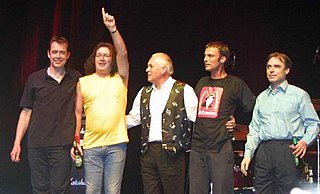
Procol Harum is an English rock band formed in 1967. Their best-known recording is the 1967 hit single "A Whiter Shade of Pale", one of the few singles to have sold over 10 million copies. Although noted for their baroque and classical influence, Procol Harum's music is described as psychedelic rock and proto-prog.

"Unchained Melody" is a 1955 song with music by Alex North and lyrics by Hy Zaret. North wrote the music as a theme for the little-known prison film Unchained, hence the song title. Todd Duncan sang the vocals for the film soundtrack. It has since become a standard and one of the most recorded songs of the 20th century, most notably by the Righteous Brothers. According to the song's publishing administrator, over 1,500 recordings of "Unchained Melody" have been made by more than 670 artists, in multiple languages.

Percy Tyrone Sledge was an American R&B, soul and gospel singer. He is best known for the song "When a Man Loves a Woman", a No. 1 hit on both the Billboard Hot 100 and R&B singles charts in 1966. It was awarded a million-selling, Gold-certified disc from the RIAA.

Ultra Naté Wyche, known professionally as Ultra Naté is an American singer, songwriter, record producer, DJ and promoter who has achieved success on the pop charts with songs such as "Free", "If You Could Read My Mind", and "Automatic".

Cutting Crew are an English rock band formed in London in 1985. They are best known for their debut album Broadcast and hit singles, "(I Just) Died in Your Arms", "I've Been in Love Before", "One for the Mockingbird", and "Everything But My Pride".

The Icicle Works are an English alternative rock band and were named after the 1960 short story "The Day the Icicle Works Closed" by science fiction author Frederik Pohl. They had a top 20 UK hit with "Love Is a Wonderful Colour" (1983). In the US and Canada, they had only one top 40 hit, the 1984 single "Birds Fly ".
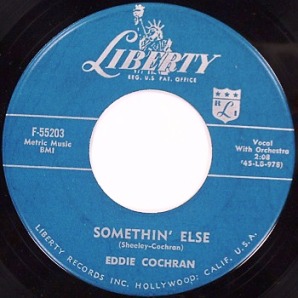
"Somethin' Else" is a song by the rockabilly musician Eddie Cochran, co-written by his girlfriend Sharon Sheeley and his elder brother Bob Cochran, and released in 1959. It has been covered by a wide range of artists, including the Johnny Hallyday and Sex Pistols.
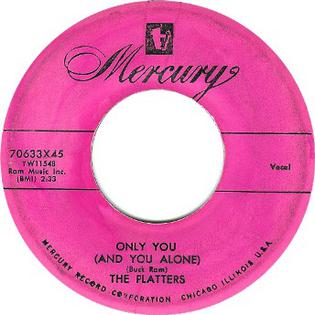
"Only You " is a pop song composed by Buck Ram. It was originally recorded by The Platters with lead vocals by Tony Williams in 1955.
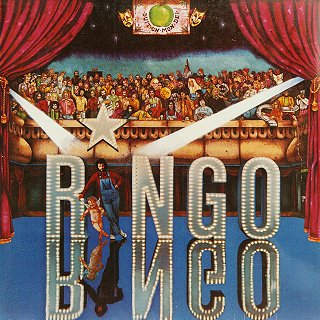
Ringo is the third studio album by English musician Ringo Starr, released in 1973 on Apple Records. It peaked at No. 7 on the UK Albums Chart and No. 2 on the Billboard 200, and has been certified platinum by the RIAA. In Canada, it reached No. 1 on the RPM national albums chart.

Dare is the third studio album by English synth-pop band the Human League, first released in the UK on 16 October 1981 then subsequently in the US in mid-1982. The album was recorded between March and September 1981 following the departure of founding members Martyn Ware and Ian Craig Marsh, and saw the band shift direction from their prior avant-garde electronic style toward a more pop-friendly, commercial sound led by frontman Philip Oakey.
Juliet Roberts is a British jazz, rock, soul and house music singer songwriter of Grenadian descent.

Goodnight Vienna is the fourth studio album by Ringo Starr. It was recorded in the summer of 1974 in Los Angeles, and released later that year. Goodnight Vienna followed the commercially successful predecessor Ringo, and Starr used many of the same players, including Billy Preston, Klaus Voormann, Robbie Robertson, Harry Nilsson, and producer Richard Perry. The title is a Liverpool slang phrase meaning "it's all over".
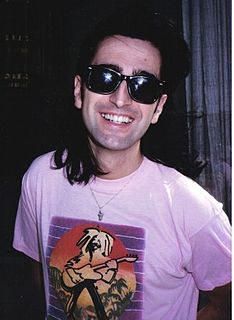
King were a British new wave band which formed in 1984. The band achieved chart success in 1985, and are best known for their hit single "Love & Pride", which reached number 2 in the UK. The band had two Top 20 albums and five Top 30 singles in the space of a year.
"For All We Know" is a soft rock song written for the 1970 film Lovers and Other Strangers, with music by Fred Karlin and lyrics by Robb Wilson and Arthur James. Both Royer and Griffin were founding members of the soft-rock group Bread. It was originally performed, for the film's soundtrack, by Larry Meredith. It is best known for a cover version by American pop duo Carpenters in 1971, which reached No. 3 on the US Billboard Hot 100 singles chart and No. 1 on the US Billboard Easy Listening chart. The song was also a hit for Shirley Bassey at the same time in the United Kingdom. It has since been covered by various artists.

Ruby & the Romantics were an Akron, Ohio-based American R&B group in the 1960s, comprising Ruby Nash, George Lee, Ronald Mosely, Leroy Fann and Ed Roberts.
"Young Love" is a popular song, written by Ric Cartey and Carole Joyner, and published in 1956. The original version was recorded by Ric Cartey with the Jiva-Tones on November 24, 1956. It was released in 1956 by Stars Records as catalog number 539 and one month later by RCA Records as catalog number 47-6751. Cartey's version never charted.
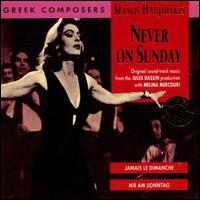
"Never on Sunday", also known by its original Greek title "Ta Pediá tou Pireá", is a popular song written by Manos Hatzidakis and first sung by Melina Mercouri in the film of same name, directed by Jules Dassin and starring Mercouri. The song won the Academy Award for Best Original Song in 1960, a first for a foreign-language picture. The film score to the movie was first released on 1 October 1960 by United Artists Records. The song has since been recorded by numerous artists, and has gained various degrees of success throughout the world.
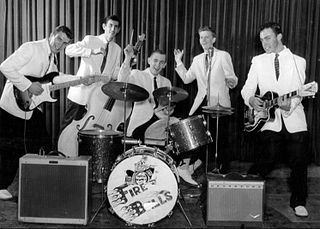
The Fireballs, sometimes billed as Jimmy Gilmer and the Fireballs, were an American rock and roll group, particularly popular at the end of the 1950s and in the early 1960s. The original line-up consisted of George Tomsco, Chuck Tharp (vocals), Stan Lark (bass), Eric Budd (drums), and Dan Trammell.
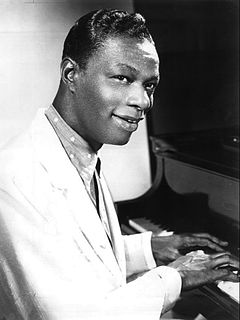
"Mona Lisa" is a popular song written by Ray Evans and Jay Livingston for the Paramount Pictures film Captain Carey, U.S.A. (1950). The title and lyrics refer to the renaissance portrait Mona Lisa painted by Leonardo da Vinci. The song won the Oscar for Best Original Song in 1950.
"Love Me Forever" is a popular song by The Four Esquires. It features orchestral backing by Sid Bass with a female session vocalist and peaked at #25 on the Billboard Hot 100 in 1957. It also reached #23 on the UK Singles Chart.
















